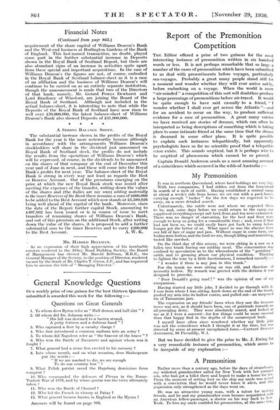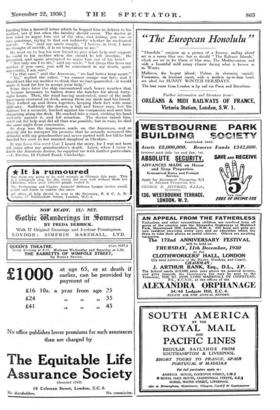Report of the Premonition Competition
Tan Editor offered a prize of two guineas for the most interesting instance of premonition written in six hundred words or less. It is not perhaps remarkable that so large a number of the cases of premonition which have been submitted to us deal with presentiments before voyages, particularly sea-voyages. Probably a great many people stand still fot a moment and wonder whether they will ever arrive safely, before embarking on a voyage. When the world is more "air-minded" a competition of this sort will doubtless produce a large percentage of premonitions before air-travel. It would be quite enough to have said casually to a friend, " I wonder whether I shall ever get across the Atlantic "—and for an accident to occur on the way, to produce sufficient evidence for a case of premonition. A great many entries we have received are stories of dreams, which can often be interpreted as being descriptions of something which is taking place to some intimate friend at the same time that the dream is dreamed in some other place. It is quite possible to explain such instances telepathically, but apparently psychologists have so far no scientific proof, that a telepathic sense exists. This sounds sceptical, but it is perhaps wise to be sceptical of phenomena which cannot be so proved.
Captain Donald Anderson sends us a most amusing account of a coincidence which occurred in the wilds of Australia :—
My Premonition
It was in northern Queensland, where land-holdings are very big. With two companions, I had ridden out from the homestead in search of a mob of cattle. Having established a central camp at about a week's ride from home, we set out with a pack-bore, carrying enough " tucker " for the few days we expected to be away, on a more detailed search.
Unfortunately, the cattle were not where we expected them to be, and, some days before we could return to the camp, our supplies of everythingexcept salt beef, flour, and tea were exhausted. There was no danger of starvation, for the beef and flour were enough to keep us going for a considerable time ;- and, even if that had not been so, we could easily have got back to camp before hunger got the better of us. What upset us was the absence, from our bill of fare of sugar and jam. Without sugar in some form, our bodies were listless, and the food we ate, though filling and nourishing, tasted like sawdust.
On the third day of this misery, we were sitting in a row on a fallen tree trunk having our Midday meal. The conversation was confined to speculation as to the whereabouts of the "perishing " cattle and to grousing about our physical condition. Thinking to lighten the tone by a little facetiousness, I remarked casually :-- "I wonder if there is any jam in this trunk."
For the trunk we were sitting on was old, and therefore Of necessity hollow. My remark was greeted with the derision it waa designed to provoke.
"Poor Donald's going mad !" was the Opinion of one of may companions.
Having started my little joke, I decided to go through with it- I rose from where I was sitting, knelt down at the end of the trunk. pushed my arm into its hollow centre, and pulled out—an unopened tin of Ts.smanicut jam.
The expression on my friends' faces when they saw the treasure trove was not, as it should have been, one of gratitude towards an all-providing deity. They were absolutely scared, and looked at me as if I were a sorcerer—for few things could be more unusual than that happy find in the depths of the urusurveyed bush. I myself have often since wondered whether any little joko was not the coincidence which I thought it at the time, but RSA directed by some at-pn3sent unexplained force.—Carmins DONALD ANDERSON, 96 Piccadilly, W, I.
' But we have decided to give the prize to Mr. J. Ewing for a very remarkable instance of premonition, which seems to be incapable of any explanation :—
A Premonition Rather more than a century ago, before the days of steamboats, my widowed grandmother sailed for New York with her younger son, who had got a billet there and hoped to make a home for her. From the moment of setting foot on the ship my uncle was seized with a conviction that he would never leave it alive, and thi3 impression only strengthened as the days went on
He was an attractive young man, with a talent for making friends, and he and my grandmother soon became acquainted iiIli an American fellow-passenger, a doctor on his way back to New York. To him my uncle confided his premonition, at the sam3 tiro.)
handing him a farewell letter which he begged him to deliver to his mother, not if but when the fatality should occur. The doctor at first tried to argue him out of the idea, and failing, put one or two questions, trying to find out indirectly whether he meditated suicide. "No." said my uncle simply, "I believe in God, I have no thought of suicide, it is no temptation to me."
No went on to beg his new friend to give what help and support he could to his mother when she should be left desolate. Ho promised, and again attempted to argue him out of his belief. Not only am I to die," said my uncle, "but (keep this from my mother if you can), you will be concerned in my death, quite innocently, I am sure." "En that case," said the American, "we had better keep apart." "No," replied the other, "we cannot escape our fate, and I should not like my mother to think that we had quarrelled—it would make it hard for her to accept your help."
Some days later the ship encountered such heavy weather that it became necessary to batten down the hatches for about forty- eight hours. Then, the wind having moderated, some of the male passengers ventured on deck, among them my uncle and his friend. They walked up and down together, keeping their feet with some difficulty. Suddenly the doctor, a tall and heavy man, lost his balance for a moment, lurched against his companion and sent him staggering along the deck. He crashed into a mast, striking his head violently against it, and fell senseless. The doctor raised him, cried out for help and did all that was possible, but in vain, he died the same night from concussion.
So deep was the impression made on the American, and so strictly did he interpret his promise that he actually recrossed the Atlantic with my grandmother and never parted with her till he had handed her over to her married daughter in Cheshire.
It wan from this aant that I heard the story, for I was not born till years after my grandmother's death. Later, when I came to know the American doctor, he supplied me with further particulars. --J. Ewnro, 13 Oxford Road, Cambridge.











































 Previous page
Previous page